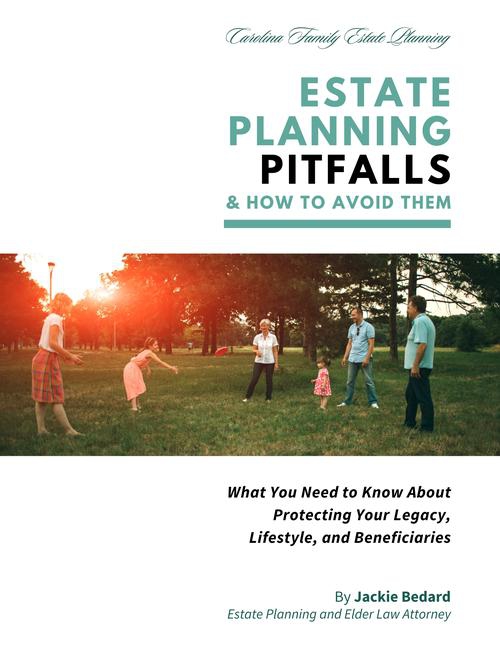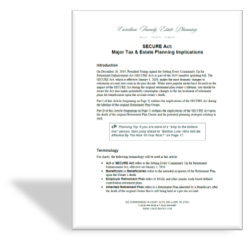
Creating a will is one of the most important steps you can take to protect your loved ones and ensure your assets are distributed according to your wishes. A will, also known as a last will and testament, is a legal document that states how you want your property and affairs handled after your death. It can include who inherits your assets, who will serve as guardian for your minor children, and who will manage your estate.
If you live in North Carolina, it's essential to understand the state's specific legal requirements for drafting a valid will. In this post, we walk through the process of creating a legally binding will in North Carolina, including what decisions you need to make and how to ensure your will stands up in court.
Legal Requirements to Create a Will in North Carolina
Under North Carolina law, to make a valid will, you must:
- Be at least 18 years old
- Be of sound mind at the time of signing (N.C. Gen. Stat. § 31-1)
- Create the will in writing (typed or handwritten)
- Sign the will yourself or have someone else sign for you in your presence and at your direction
Have the will witnessed by at least two competent individuals who also sign the will in your presence (N.C. Gen. Stat. § 31-3.3)
While not legally required, North Carolina allows you to attach a self-proving affidavit to the will. This document is signed by you and your witnesses in front of a notary and can speed up the probate process later.
Step-by-Step: How to Create a Valid Will in North Carolina
1. Take Inventory of Your Assets
List all major assets, including real estate, bank accounts, vehicles, investments, and personal property. Think about who you want to receive each item.
2. Decide on Your Beneficiaries
Clearly name the individuals or organizations who will inherit your property. Be specific to avoid confusion or disputes.
3. Choose an Executor
Select a trusted person to carry out the terms of your will. This person will handle your estate, pay debts, and distribute assets. Choose someone organized and reliable.
4. Appoint a Guardian for Minor Children
If you have children under 18, name a guardian who will care for them in your absence. You can also name a separate financial guardian to manage any inheritance.
5. Draft the Will
You can write the will yourself, use a reputable legal software, or hire an estate planning attorney. While DIY options exist, professional guidance ensures your will complies with North Carolina law and reflects your true intentions.
6. Sign the Will in Front of Witnesses
Sign your will in the presence of at least two competent witnesses, and have them sign as well. They should not be beneficiaries of the will.
7. (Optional) Add a Self-Proving Affidavit
This notarized document makes probate easier by confirming that the will was properly executed. It prevents the need to locate witnesses after your death. N.C. Gen. Stat. § 31-11.6.
Special Types of Wills Recognized in North Carolina
- Holographic Will: Handwritten and signed by the testator. Valid without witnesses, but often harder to validate in court. N.C. Gen. Stat. § 31-3.4.
- Nuncupative (Oral) Will: Only valid in very limited situations, such as imminent death, and must be written down quickly by witnesses. N.C. Gen. Stat. § 31-3.5.
Can I Revoke or Change My Will?
Yes. In North Carolina, you can change or revoke your will at any time as long as you are of sound mind. Life changes, such as marriage, divorce, the birth of a child, or acquiring new assets often make it necessary to update your estate plan documents.
You can revoke a will by either creating a new one that clearly cancels the old version (N.C. Gen. Stat. § 31-5.1) or by physically destroying the original, such as tearing, burning, or shredding it with the intent to revoke.
If you only want to make minor changes to your will, you can do so by creating a codicil. A codicil is a separate legal document that updates specific parts of your will. Just like the original will, it must be signed and witnessed according to North Carolina law.
It’s also important to understand how divorce affects your will. Under North Carolina law, if you divorce or a court finds your marriage invalid, any part of your will that leaves property to your former spouse or names them as executor is automatically revoked. This rule doesn’t apply if you remarry the same person or clearly state in your will (or in a divorce decree or property agreement) that divorce shouldn’t change its terms. See N.C. Gen. Stat. § 31-5.4 for details.
💡 It’s best to consult with an estate planning attorney before making changes to ensure your updates are legally valid.
Heads-up! A Will May Not Be Enough
It’s important for you to consider that, even if your will meets all legal requirements, it might not be enough to fully protect your family and your estate. Here’s why:
Your Will Must Go Through Probate
In North Carolina, your will must be filed with the Clerk of Superior Court after your death. This starts the probate process, a public, court-supervised procedure that can be time-consuming and costly.
Probate Can Delay Access to Assets
Your loved ones may have to wait months (or longer) before they can access your bank accounts, sell property, or cover essential expenses.
Wills Don't Protect Against Incapacity
If you become incapacitated before death, your will has no power because it only takes effect after you pass away. You need documents like a durable power of attorney and healthcare directives to ensure your wishes are honored.
Wills Don’t Offer Privacy
Wills become public record when filed with the court. If privacy is a concern, consider using a revocable living trust to keep your affairs confidential.
What Happens If You Die Without a Will in North Carolina?
If you pass away without a will (intestate), North Carolina’s intestacy laws determine who inherits your assets. This process does not account for your personal wishes or family dynamics.
- The Clerk of Superior Court will appoint someone to administer your estate, which may not be the person you would have chosen.
- Your spouse and children are first in line, but exactly how your estate is divided depends on whether you have living descendants, parents, or siblings.
- If you have minor children, a judge will decide who becomes their guardian.
- Without a will, you cannot leave gifts to friends, charities, or non-relatives.
This often leads to delays, unexpected distributions, and family disputes. Creating a will allows you to maintain control and provide clear instructions.
Final Thoughts
A will is a foundational estate planning document and an essential part of your plan. For real peace of mind, talk with an experienced North Carolina estate planning attorney who can help you draft a legally sound will, avoid probate pitfalls, and build a comprehensive plan that protects your family.
Ready to take the next step? Click here to schedule a free case assessment, or give us a call at (919) 443-3035. Let’s create a plan that gives you confidence today and clarity for the future.
FAQs About Wills in North Carolina
1. What is the difference between “a will” and “a living will”?
A will outlines how your assets should be distributed after your death, while a living will (also known as an advance directive) states your preferences for medical care if you become incapacitated.
2. Do wills in North Carolina need to be notarized?
Notarization is not required to make a will valid in North Carolina, but adding a notarized self-proving affidavit can simplify the probate process.
3. Can I write my own will in North Carolina?
Yes, you can write your own will, but it must still meet all legal requirements. Handwritten (holographic) wills are valid if properly signed, though they are often more difficult to prove.
4. What assets do not pass through a will?
Assets with designated beneficiaries, like life insurance policies, retirement accounts, and jointly owned property generally pass outside of a will.
5. Do I need a lawyer to make a will in North Carolina?
While it’s not required, working with an estate planning attorney can help ensure your will is valid, clearly written, and aligned with your broader estate planning goals.







